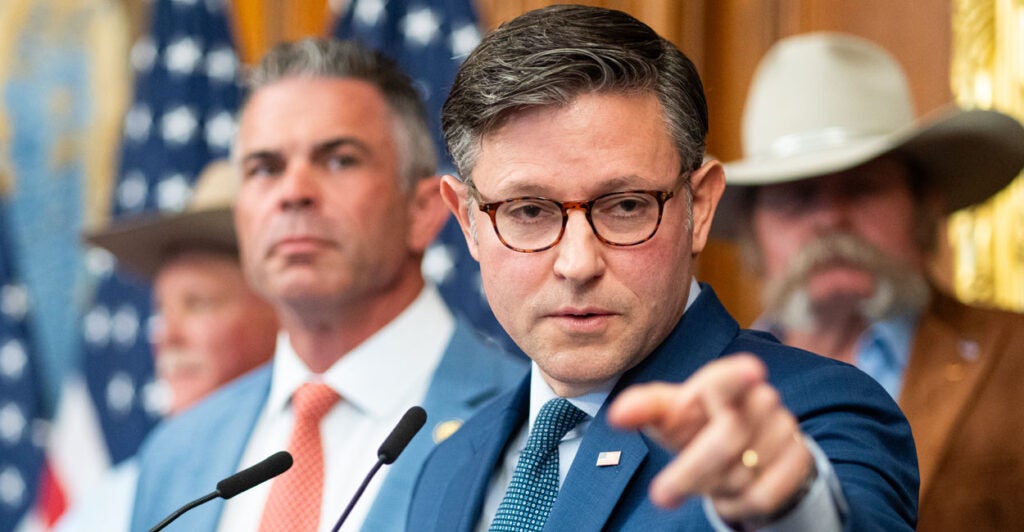Autumn is approaching on Capitol Hill, and with it, another shutdown battle.
On Tuesday, Speaker of the House Mike Johnson, R-La., presented his fix to fund the government and avoid an end-of-September government shutdown—a seven-week continuing resolution to extend funding levels from former President Joe Biden’s administration.
He explained to reporters that the goal of the continuing resolution is to buy time for the normal appropriations process, in which committees would pass new, individual spending bills in regular order.
“We have made substantial progress in government funding. This year, the House Appropriations Committee has passed all 12 [spending] bills out of committee,†said Johnson. “We need responsible options here to keep the government open while all this work continues.â€
Johnson pledged a “short-term, clean continuing resolution that will keep the government funded and operating at current levels while we continue all this work.â€
But the bill won’t be 100% “cleanâ€â€”that is, without alterations from previous spending.
Johnson acknowledged to The Daily Signal that the continuing resolution will include new spending to ensure lawmakers’ security in the wake of the assassination of Turning Point USA founder Charlie Kirk last week.
“It will be partially addressed in the [continuing resolution] and more to come,†he told The Daily Signal. “So, we have a short-term addition for the member-security issue, and then we’ll be looking at the [legislative] branch appropriations bill to have the further funding.â€
There’s also the issue of health care. For weeks, Democrats have been demanding some concession on health care—either the reversal of cost-saving health care reforms from the budget reconciliation bill, or possibly an extension of soon-to-expire COVID-era Obamacare tax credits.
Johnson, however, says that the issue of expiring credits is not so pressing, since they are set to expire at the end of the year, months after the impending Sept. 30 deadline to fund the government.
“They don’t expire until the end of the year, and so we have until December to figure that all out,†he said.Â
 Speaker of the House Mike Johnson, R-La. (Bill Clark/CQ-Roll Call via Getty Images)
Speaker of the House Mike Johnson, R-La. (Bill Clark/CQ-Roll Call via Getty Images)
He explained that these Biden-era policies, which enhanced health care premium tax credits and extended them to higher earners, are not so popular with Republicans.
“Republicans have concerns about those policies, if you look at how much they’ve been abused …. People make $600,000 a year and get a government subsidy for their health care.â€
It remains to be seen how Democrats will respond to Johnson’s plan. In the Senate, Republicans will need Democrat votes in order to reach the 60-vote threshold required to end debate on any funding measure.
On Tuesday morning, Democrat House Conference Chair Pete Aguilar, D-Calif., told reporters that his party had not yet come to a decision, since they had not seen the text of the continuing resolution yet.
House Minority Whip Katherine Clark, D-Mass., “can’t whip on something that doesn’t exist,†he explained.
But Democrats aren’t so much a problem for Johnson in the House as they are for Senate Majority Leader John Thune, R-S.D.
Johnson’s Headstrong Republicans
In the House, Johnson has to make sure he unites his Republican conference, where—due to the sudden resignation of Rep. Mark Green, R-Tenn., and the election of Rep. James Walkinshaw, D-Va., in a special race in Virginia last week—his majority has shrunk.Â
With current margins, Johnson can only afford to lose three Republican votes in a party-line vote if he is to pass a continuing resolution by a simple majority.
Rep. Thomas Massie, R-Ky., appears to be in emphatic opposition, alongside other headstrong fiscal hawks.
“This [continuing resolution] would be a copy of the uniparty spending bill under Autopen Biden,†he wrote on the social media platform X on Monday. “I didn’t vote for those spending priorities when Biden was President, and I won’t vote for them now.â€
Rep. Marjorie Taylor Greene, R-Ga., also has been expressing her unequivocal displeasure with a continuing resolution for weeks.
“I can’t wait to see how voting for the CR becomes a Trump loyalty test,†she wrote on X on Monday, before the seven-week measure was officially proposed. “When in all actual reality, it’s a disloyalty to him by passing a Biden policy laden omnibus.â€
Additionally, Rep. Victoria Spartz, R-Ind., wrote on X on Sunday, “Thanksgiving CR—NO. I am willing to vote for a CR of any duration—short or long—the least damage to the Republic, but I cannot support one that ends funding right before a major holiday to jam us with an Omnibus. I’ve seen this playbook too many times.â€
 Rep. Victoria Spartz, R-Ind. (Anna Moneymaker/Getty Images)
Rep. Victoria Spartz, R-Ind. (Anna Moneymaker/Getty Images)
There’s also Rep. Warren Davidson, R-Ohio, a fiscal hawk who voted against the “big, beautiful bill†when it first came through the House. He has spoken out against a continuing resolution that precedes spending increases.
“I already hated status quo thinking and approaches (soft incrementalism at best), so I’m out on another CR for the sake of more government,†he opined on X on Monday. “We know we need a smaller, more accountable, more focused America First government. I will tolerate nothing else.â€
Still, history shows that Johnson usually gets his way in these contentious legislative disputes, with his leadership team overcoming Republican hesitancy to pass a continuing resolution, cuts to foreign aid and public broadcasting, and a 10-year budget reconciliation package.
The post Johnson Unveils Bill to Extend Biden Spending, Avert Shutdown appeared first on The Daily Signal.